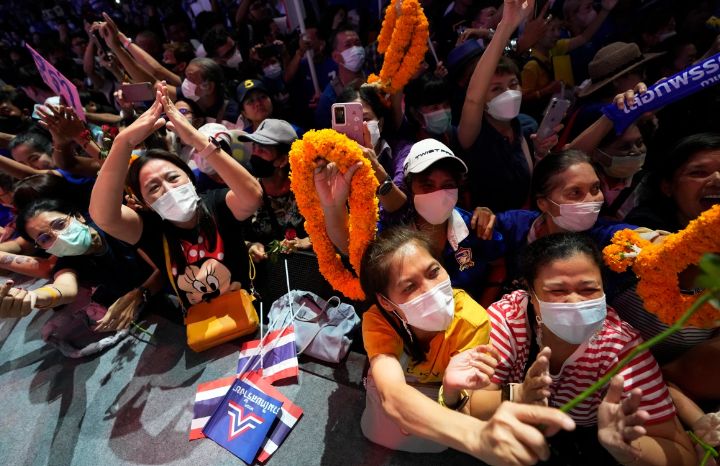By Eric Vandenbroeck
and co-workers
Thailand, China, And The US
Thailand will hold
its first national election this weekend in over four years, and only its second
since a coup d’état nine years ago. Regardless of its outcome, the adage that
“politics stops at the water’s edge” is sure to hold concerning the kingdom’s
prevailing foreign policy orientation toward China and to result in further
weakening of its treaty alliance with the United States.
Last year was the
United States’ strongest in Thailand since the coup. In February, in the Biden
administration’s report on the U.S. Indo-Pacific
Strategy—the first to be released publicly from the White House—Thailand
was mentioned on page one, and the first-ever combined U.S.-Thailand Strategic
and Defense Dialogue took place in Washington in May. The Thais then remained
in town for the U.S.-ASEAN (Association of Southeast Asian Nations) Special
Summit, the first ever to be held in Washington, D.C., and effectively an
apology for the Trump administration’s treatment of Thailand during its ASEAN
chair year in 2019.
Thailand then joined
12 other nations in signing on to Biden’s new Indo-Pacific Economic Framework
for Prosperity. An agreement in June concerning technology that detects threats
to military installations was little-noticed but significant, as it was
negotiated by the U.S. Air Force, which had expressed concern about
increasing Thai-Chinese air force cooperation since 2015.
During the summer,
the United States stepped up its ground game in Thailand with high-level
visits. U.S. Defense Secretary Lloyd Austin discussed military modernization
and interoperability with his Thai counterparts. U.S. Secretary of State Antony
Blinken and Thai Foreign Minister Don Pramudwinai
signed a bilateral communiqué they extolled as an expansion of the “communiqué in Washington
60 years ago that solidified the US-Thai alliance,” signed by then-Thai Foreign
Minister Thanat Khoman and
then-U.S. Secretary of State Dean Rusk. And the U.S. Embassy in Bangkok
received a new ambassador, Robert F. Godec, who
differed from his predecessor, appointed by former U.S. President Donald Trump,
in having held two previous ambassadorships during 37 years of foreign service
experience.
The fourth visitor
arrived in November, accompanied by controversy. On the one hand, the
attendance of Vice President Kamala Harris at the Asia-Pacific Economic
Cooperation (APEC) gathering could only be seen as the quintessentially
American mistake it had been making in Thailand for 25 years. After Bangkok
agreed to change the original APEC dates to accommodate midterm U.S.
congressional elections, Biden still chose to attend the moveable feast of his
granddaughter’s wedding over a gathering of 15 fellow heads of government. The
Thais gave Chinese President Xi Jinping a rock star’s welcome and, six months
on, have primarily forgiven the White House but not forgotten.
Yet somewhat blunting
the damage was that Harris was in Thailand after skipping it on a trip to the region in 2021, and that
earlier in the month, Biden himself had attended the ASEAN summit in Cambodia
and upgraded U.S.-ASEAN relations to a “comprehensive strategic partnership.”
To the last in-person ASEAN summit, Trump had sent a national security advisor
who was less than two months into his job and had never worked in Asia.
In contrast to a
banner year for America, Chinese relations with Thailand in 2022 hit an equally
rare rough patch. Beginning in January, Beijing upset trade ties with the
continued closure of its land borders, which Thais depend upon for many of
their exports of rubber, electrical parts, produce, and other perishables to
China. The same happened to Thai seafood, cars, and other goods when turnaround
times at ports in Shanghai and Shenzhen went from hours to weeks. Nor could
coveted Chinese travelers leave their country: Thailand’s total 11.5 million tourists in 2022 was nearly equal to those from
China alone in 2019.
Pre-COVID-19, the
Chinese had also bought the largest share of Thai condominiums sold to
foreigners—nearly 10 times larger than the next country. During the first
quarter of 2022, however, transfers to Chinese buyers dropped by 38 percent as
city after city in China went into lockdown.
This hit Thailand’s
private and public sectors hard, as its post-coup governments had bet heavily
on unchecked condo construction. Overall, Thailand’s trade deficit in goods and
services with China, which had soared from $21 billion in 2020 to $30 billion
in 2021, crested $31 billion last year when it might have decreased
substantially instead.
This concerned the Thais,
but they knew that China’s zero-COVID policy would eventually end. According to
this author’s official sources, what unsettled them was Beijing’s abrupt
replacement of policies and practices governed by information and a balance of
interests—and which had fueled its growth for three decades—with those driven
by ideology.
Thais welcomed
China’s belated opening in December but worried about what newly arrived
tourists might be carrying with them since Beijing continued to share risible
COVID-19 statistics when it deigned to share them at all. From the start, it
had made available to its citizens only domestic vaccines, refusing to acquire
Western-developed mRNA versions and even sowing disinformation about them.
This, too, mattered to Thailand since Sinovac and Sinopharm vaccines, which it
purchased from China, had long proven less effective than the vaccines in the
United States since the coup.
In 2016, Thailand’s
junta drafted a new constitution establishing a 250-seat Senate appointed
entirely by military officials. Because the Senate votes for the prime minister
alongside the House of Representatives, the lower house of the Thai parliament,
this move boosts the junta’s preferred candidate. In Thailand’s most recent
elections in 2019, Prayuth won a second term—despite the opposition Pheu Thai
Party winning more seats in the House.
How Will Sunday’s Election Work?

Around 52 million
people are eligible to
vote in Thailand, or approximately 72 percent of the population. This year,
voters will fill out two ballots for the first time: one to choose their local
representative in the 500-seat House of Representatives and one to designate
their preferred party. The House will allocate 100 seats for appointed party
officials based on which parties receive the most public support. The threshold
for a party to qualify for seats has increased, providing bigger parties an
advantage.
Unofficial voting
numbers are expected on Sunday night, but local election authorities said the
official results would likely not be confirmed for weeks. At that point,
parties that garnered more than 25 seats in the House can put
forward a candidate
for prime minister, with a vote likely to be held in August. To win the top
post, a candidate must secure 376 votes, which can be drawn from both the House
and the Senate.
Recent polling shows
that the opposition parties could overcome the military’s Senate advantage if
they band together. This year is also likely to be the last time the Senate
will vote for Thailand’s prime minister, as a rule, was established in 2017 as
a temporary measure.
Which Parties Are Running?
The newly created United
Thai Nation Party leads the conservative pack led by Prayuth. He hopes that
solid backing from the military will propel him to a third term, but a split
within the junta could threaten his success. Former army chief Prawit Wongsuwan now leads the military-aligned Palang Pracharat Party. Another
conservative party, Bhumjaithai, also threatens
Prayuth’s dominance. Bhumjaithai ruled in the current
coalition government and won some public support by leading the charge to decriminalize
marijuana in Thailand.
Prayuth's campaign

Prayuth’s most
significant challenge comes from the pro-democracy PheuThai
Party, led by 36-year-old political scion Paetongtarn
Shinawatra. The Pheu Thai Party is currently showing in polls and hopes for a
landslide. Other progressive parties are scrambling for seats, too,
specifically the Move Forward
Party. Led by Pita Limjaroenrat, Move Forward has taken Thailand’s youth by
storm. The party campaigned to reform Thailand’s monarchy and ban the military
from politics.
The Pheu Thai Party
must tread a fine line between achieving an extensive enough victory to
overcome the Senate’s challenge and not sparking another coup. However, this
compromise may rankle its supporters, not to mention the reform-minded young
activists who led mass protests in 2020.
What Are The Most Significant Issues On The Table?
Thailand, which is
Southeast Asia’s second-largest economy, is facing a financial
crisis. The COVID-19
pandemic hit the country’s tourism sector hard, and recovery has been slow.
This has made boosting the country’s prospects for solid economic
growth a key campaign issue. Many candidates have proposed changes to state welfare benefits and increasing the
minimum wage.
For updates click hompage here